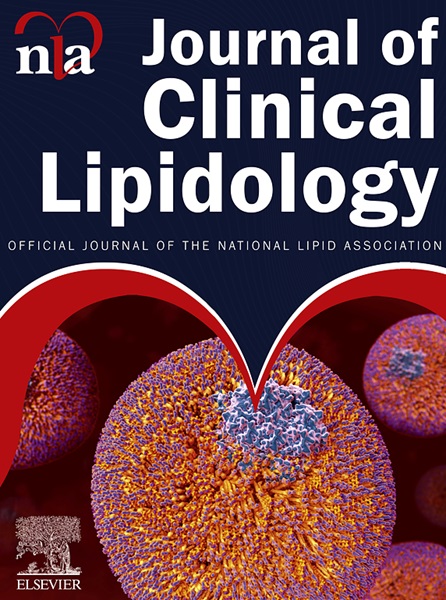哥伦比亚高甘油三酯血症患者中甘油三酯代谢基因的遗传变异
IF 3.6
3区 医学
Q2 PHARMACOLOGY & PHARMACY
引用次数: 0
摘要
人们对拉丁美洲严重高甘油三酯血症(sHTG)的遗传基础了解不足。在哥伦比亚患有严重高甘油三酯血症(sHTG)的成年人中,找出与甘油三酯(TG)代谢有关的基因变异。在一生中至少有一次血浆甘油三酯(TG)≥880 毫克/分升的个体中,我们扩增了基因的所有外显子和内含子/外显子边界,并对其进行了测序。根据美国医学遗传学会(ACMG)的标准,我们确定了每个变异的位置、等位基因、等位基因频率和致病性分类。该研究包括 166 名参与者(62% 为男性,平均年龄 50 岁),其 TG 峰值介于 894 至 11,000 mg/dL 之间。我们发现了 92 个变体:19个,7个,11个,38个和17个。这些变异中有 18 个尚未报道。我们在(c.41C>A;p.Ser14*)中发现了一个新的致病变体,在(c.1527 C>T;p.Pro509=,也表示为 c.1447C>T;p.Gln483*)中发现了一个新的可能致病变体,在(c.779G>A;p.Trp260*)中发现了一个已知致病变体。四名参与者为 c.953A>G;p.Asn318Ser(已知的高甘油三酯血症风险因素)变异的杂合子。与其他基因中存在意义不明变异(VUS)的参与者相比,胰岛素峰值明显更高。有胰腺炎病史的参与者的 TG 峰值为 4317 毫克/分升,而无胰腺炎病史的参与者的 TG 峰值为 1769 毫克/分升(=0.001)。我们的研究发现了拉美裔人群中与胰高血糖素相关的变异,并表明在这一人群中,胰岛素基因变异可能经常与胰高血糖素相关。本文章由计算机程序翻译,如有差异,请以英文原文为准。
Genetic variants in triglyceride metabolism genes among individuals with hypertriglyceridemia in Colombia
The genetic substrate of severe hypertriglyceridemia (sHTG) in Latin America is insufficiently understood. To identify genetic variants in genes related to triglyceride (TG) metabolism among adults with sHTG from Colombia. In individuals with plasma TG≥880 mg/dL at least once in their lifetime, we amplified and sequenced all exons and intron/exon boundaries of the genes and . For each variant we ascertained its location, zygosity, allelic frequency and pathogenicity classification according to American College of Medical Genetics (ACMG) criteria. The study included 166 participants (62 % male, mean age 50), peak TG levels ranged between 894 and 11,000 mg/dL. We identified 92 variants: 19 in , 7 in , 11 in , 38 in , and 17 in . Eighteen of these variants had not been reported. We identified a new pathogenic variant in (c.41C>A; p.Ser14*), a new likely pathogenic variant in (c.1527 C > T; p.Pro509=, also expressed as c.1447C>T; p.Gln483*), and a known pathogenic variant in (c.779G>A; p.Trp260*). Four participants were heterozygous for variant c.953A>G; p.Asn318Ser in , a known risk factor for hypertriglyceridemia. Participants with variants of unknown significance (VUS) in had significantly higher peak TG than those with VUS in other genes. Peak TG were 4317 mg/dL in participants with a history of pancreatitis, and 1769 mg/dL in those without it ( = 0.001). Our study identified variants associated with sHTG among Latinos, and showed that genetic variation in may be frequently associated with sHTG in this population.
求助全文
通过发布文献求助,成功后即可免费获取论文全文。
去求助
来源期刊
CiteScore
7.00
自引率
6.80%
发文量
209
审稿时长
49 days
期刊介绍:
Because the scope of clinical lipidology is broad, the topics addressed by the Journal are equally diverse. Typical articles explore lipidology as it is practiced in the treatment setting, recent developments in pharmacological research, reports of treatment and trials, case studies, the impact of lifestyle modification, and similar academic material of interest to the practitioner.
Sections of Journal of clinical lipidology will address pioneering studies and the clinicians who conduct them, case studies, ethical standards and conduct, professional guidance such as ATP and NCEP, editorial commentary, letters from readers, National Lipid Association (NLA) news and upcoming event information, as well as abstracts from the NLA annual scientific sessions and the scientific forums held by its chapters, when appropriate.

 求助内容:
求助内容: 应助结果提醒方式:
应助结果提醒方式:


